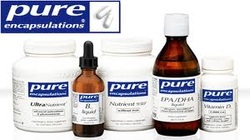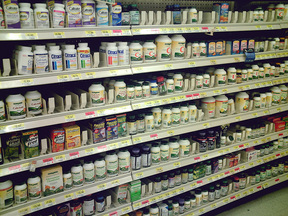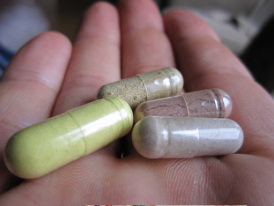 Part 4: Supplement series Which supplements should I take? There are literally thousands of supplements on the market, one purported to satisfy virtually every human need and desire. Can’t sleep? Google insomnia and see how many supplements are available to help you get to bed. Going bald? Anxious? Overweight? Underweight? Memory problems? Stiff joints? Achy muscles? Depressed? For any human problem there exists a solution in the form a supplement for which there is often no scientific evidence to support the manufacturer’s claim. By contrast, there are a small group of supplements for which adequate research has been conducted demonstrating both safety and efficacy to a sufficient degree to enable doctors to prescribe them. When a supplement has been shown to have clinical efficacy the next criterium I look at is the quality of the product. At our office we use mostly Pure Encapsulations products. In our experience, Pure Encapsulations manufactures the highest quality supplements on the market. They are NSF certified and GMP registered and their products are Pharmaceutical Grade, exceeding the standards of the United States Pharmacopeia (USP). All Pure Encapsulations supplements are manufactured in their own state-of-the-art plant in Massachusetts from the highest quality raw ingredients from the U.S., France, Japan, Switzerland, Germany, and Italy. All ingredients and final products are tested for purity and potency by independent certified laboratories. All capsules are hypoallergenic and vegetarian, and there are no added coatings, binders, shellacs, artificial flavors, sweeteners, colors, fragrance, or excipients. In short, we believe Pure Encapsulations to make the industry’s best products. Which specific supplements should you take? As you will find out in the next section, that depends on you. Keep reading... Before I recommend a supplement to a patient, I ask myself whether or not, in my patient’s situation, taking into account his or her medical condition, health goals, and financial means I would be willing to purchase that supplement for myself. Everyone is a little different and depending on one’s age, gender, lifestyle, medications, and current health status, what I would recommend to one person I might not recommend to another. That being said, there are a few special supplements which play a vital role in anti-aging and health promotion which have wide application. You may use the guidelines in my next post to get an idea of what might be right for you, but it is essential that you speak with your doctor prior to beginning any new therapy, including the handful of supplements which I use and recommend. Read Next: Beyond Nutrition; Health as a Level of Function: Supplements
0 Comments
 Part 3/Supplements How do I choose the right brand of supplements? The first thing to understand is that there are three categories of nutritional supplements: Feed Grade, Food Grade, and Pharmaceutical Grade. Although the FDA does not regulate or oversee the production or sale of nutritional supplements, it has created guidelines by which to evaluate their quality, known as GMP (Good Manufacturing Practice) regulations. The National Science Foundation (NSF) has added recommendations to GMP which has led to the creation in the United States of a set of standards which can be used to categorize supplements: Feed Grade supplements meet the scientific standards for safe animal consumption. Food Grade supplements meet the scientific standards for safe human consumption. Pharmaceutical Grade supplements meet the same scientific standards for efficacy, purity, safety, and reliability as drugs. Pharmaceutical Grade (PG) supplements must be a minimum of 99% pure, contain no binders, fillers, excipients, dyes, flavor enhancers, or undisclosed substances. They are standardized such that each pill, capsule, or metered dose of the substance contains the correct amount(s) of active ingredient(s) as is indicated on the label. In addition, PG supplements are formulated to yield a higher degree of bioavailability (the ability of the body to absorb and utilize the substance) than are Food Grade (FG) supplements. In this way, smaller doses of PG supplements may in fact carry more benefit than higher doses of FG supplements commonly carried by supermarkets and pharmacies in the United States. Most PG supplements are available only through doctors, although recently some manufacturers have begun offering these products in specialty retail stores and online. Because PG supplements are a superior product, they do generally cost more than FG. Depending upon the supplement, the grade can make a critical difference in terms of not just efficacy but safety as well. For example, Omega-3 fatty acids (fish oils) are a very important and popular supplement which should only be consumed if it is PG (more about this later). In other cases, however, FG, while not as pure, potent, or reliable as PG, may be good enough and worth buying for people on a tight budget. Vitamin C is an example of a popular supplement for which a FG version would suffice for most people (again, more about this later). When buying FG supplements, a good rule of thumb is to purchase well-known, ‘big’ brands, such as Centrum, or Life Extension. Another good idea is to visit your local vitamin shop and speak to the salesperson in charge. He or she should be able to guide you toward the best quality FG products on the market. If you decide to purchase PG supplements, speak to your doctor. Here at our chiropractic office, we sell Pure Encapsulations supplements at prices which compete with–and in some cases beat–many of the Food Grade products found in retail stores and supermarkets. Check out the products we offer here: http://www.purecapspro.com/drberkoff Author: Dr. Gregory Berkoff Part 2 of the supplements series
No. Well, yes. Okay, read on... Everything bodies need nutritionally to maintain adequate health and function can be provided through a proper diet. Protein, healthy fats, fiber, vitamins, anti-oxidants, and minerals are abundant in nature, and without too much effort or expense, adequate nutrition in the United States should be the rule. Sadly, this is not the case. One reason is that our lifestyles have changed in such a way that convenience is often the deciding factor in choosing what, when, and how we eat. Fresh, nutritious foods are generally less convenient and more costly than packaged, processed foods. In 1970, Americans spent about $6 billion on fast food; by 2000, that number grew to more than $110 billion! Americans today spend more money on fast food than they do on higher education, computers, or cars. The problem, as we all know, is that fast food tends to be high in bad stuff like preservatives, additives, flavor enhancers, saturated and trans-fats, sugar, starchy carbohydrates, extreme levels of sodium, and of course calories, while also being notoriously low in the good stuff we need like vitamins, minerals, lean protein, fiber, and healthy fat. It is recommended that adults eat at least 6 servings of fresh fruits and vegetables per day. But do you? On average, Americans eat less than one and a-half servings of fruits and veggies per day with nearly 20% of adults reporting consuming less than one whole serving of fresh fruit per week! Statistics show that nearly half of young adults regularly skip breakfast and about one quarter regularly skip lunch. Skipping meals leads to habitual snacking, and more than half of all Americans eat packaged, processed snack food on a daily basis. Like other fast foods, most snack foods are high in bad stuff and low in the good stuff. Perhaps most alarming is the fact that so-called ‘healthy snacks,’ like granola, energy bars, trail mix, fruit roll-ups, raisins, and ‘power bars,’ are often not much better for you than chips or candy. Marketed as ‘natural’ and ‘health’ foods, these items are generally loaded with sugar and processed with chemicals to keep them from spoiling or clumping. To your body there is little difference between trail mix and a candy bar. Fast food, junk-food snacking, caffeine-laden ‘energy drinks,’ missed meals, and late night eating are all part of our fast-paced American lifestyle and the result is that most Americans are not getting all the nutrients they need from their diet. As if this weren’t enough reason to consider nutritional supplementation, fruits and vegetables are simply not as packed with nutrients as they once were. Many health professionals now believe that the recommendation of 6 servings/day of fresh fruits and/or veggies should be increased to 6-8 servings. Commercial farming practices have led to soil depletion, breeding of crops (and animals) for size and appearance over nutritional value, and the picking of produce long before many of the most important healthful nutrients have been adequately absorbed or developed. In 2004, The Journal of the American College of Nutrition published startling findings which showed that the nutritional value of fruits and vegetables have been steadily declining since 1950.(2) Produce, though bigger and better looking than ever, has less taste and lower nutritional value than it once did. Broccoli in 2004 contained about half the calcium it did in 1950, and that’s just the tip of the nutrient-drain iceberg. Levels of calcium, riboflavin, vitamin C, iron, potassium, and protein in virtually all commercially grown produce have significantly declined, and this report covered only a few common nutrients; potential declines in lesser-known but highly important nutrients like lycopene and zeaxanthin are unknown. The growth of organic farming and the increasing popularity of Farmers Markets which offer foods of higher nutritional value, grown in more nutrient dense soil, and typically allowed more time to ripen on the vine or tree, represent our best attempt to reverse the nutrient drain. Organic and sustainably farmed foods could potentially eliminate the need for supplementation to achieve adequate nutrition. But are you eating 6-8 servings of organic produce each day? And what do we have to do to get better than just “adequate” nutrition? Author: Dr. Gregory Berkoff Part 1 of the series/Supplements
What, exactly, is a ‘supplement’? In the minds of many people, the term ‘supplement’ is synonymous with vitamins and/or minerals. Vitamins and minerals are known to be necessary for good health, and supplementation is generally understood as a means of getting from pills or drops important health-promoting substances lacking in one’s diet. But today, supplements refer to a wide array of substances, not just vitamins and minerals, purported to address needs which go far beyond maintaining adequate nutrition. From anti-aging to performance enhancement, dietary supplements have grown from a niche market within the domain of complementary and alternative medicine (CAD) to a multi-billion dollar industry with cosmetic, fitness, memory, and other applications. According to a recent study in the American Journal of Epidemiology, it is estimated that as many as 52% of Americans take some form of dietary supplement on a regular basis.(1) Do you? Should you? If so, which ones? In this discussion, I will attempt to answer some of the most common questions asked regarding nutritional supplements, and to provide a framework for understanding the risks, benefits, and limitations of supplementation as a tool for improving health and well-being. What is the difference between a medicine and a supplement? For fun take this short quiz; after each of the following four statements mark a ‘T’ if you believe the statement to be true, or an ‘F’ if you believe it to to be false: 1. Drugs are synthetically manufactured in laboratories, while supplements are naturally occurring substances, harvested or gathered for consumption. T/F 2. Drugs always carry the risk of side effects, while supplements are benign and, generally speaking, carry little to no risk of side effects. T/F 3. Drugs weaken the body by taking over the work normally done by our own cells while supplements strengthen the body by providing our cells with the nutrition they need to work better. T/F 4. Drugs, in addition to having side effects, are often toxic to vital organs such as the liver, especially when taken over long periods of time; supplements, by contrast, are excreted in the urine and are generally not toxic. While each of these statements contains a kernel of truth, they are, in fact, technically all false. Yes, drugs are typically synthetically manufactured, but so are many supplements including most vitamins. It is true that drugs always carry the risk of side effects, but so do all supplements. Consider the following list of symptoms: nausea, vomiting, diarrhea, flushing, headache, fatigue, insomnia, and skin rash. If these were the list of side effects associated with a drug prescribed by your doctor, would you hesitate when filling that prescription? In fact, these are the most common side effects associated with high-dose Vitamin C supplementation! Drugs can weaken us, especially when administered too soon or inappropriately (such as when antibiotics are wrongly prescribed for colds), but supplements can weaken us too; high dosing of certain vitamins lowers our ability to absorb and utilize those nutrients through a process known as down-regulation. And while toxicity issues exist for most medicines, the same is true of many supplements. For example, fat soluble vitamins such as A, D, and E, are stored in our fatty tissues, including the liver, and too high doses over time can cause liver damage. Perhaps most importantly, while the manufacturing of drugs is strictly regulated for purity, cleanliness, and consistency by the FDA, supplements are under no such regulatory mandate. The result is that many supplements contain contaminants and/or are inconsistent in their dosing which can lead to toxicity. This is actually legal! A manufacturer’s use of terms such as, “standardized,” “certified,” or “verified” does not legally guarantee the purity, quality, or consistency of a nutritional supplement. Before a drug can be brought to market in the United States, it must be tested for safety, reliability, and efficacy according to extremely rigorous protocols and high standards set by the FDA. By contrast, the only real limitation on the manufacturing and sale of supplements is that the product label information may not be knowingly misleading. And even this marginal regulatory control can be easily circumvented. Manufacturers can make virtually any claim about a supplement as long as the label contains the following disclaimer, “These statements have not been evaluated by the FDA. This product is not intended to diagnose, treat, cure or prevent any disease.” Hour-long infomercials and other other powerful marketing tools containing extravagant claims about the power of supplements to restore joint health, reverse aging, promote fat burning, increase libido, or even cure diseases, are legal, even if there is no scientific basis for such claims, provided this disclaimer is included. The result is that many supplements on today’s market have little or no clinical efficacy and some may actually be harmful. In an unregulated market it is difficult to separate what works and is safe from what does not work and/or is harmful. In this discussion I will offer some guidelines for how to tell the difference. If supplements can be dangerous, should I just stay away from them altogether? No. As in other areas of life, not all manufacturers of nutritional supplements are alike. Some manufacturers, despite the lack of legal requirement for regulation and oversight, take great pains to follow the same rigorous standards set by the FDA for drugs to provide consistent, clean, reliable, safe products. Naturally, this raises production cost, but paying a little more for a safe, clean, reliable product is worth it, especially today when many nutritional supplements are manufactured overseas, often using laboratories and machinery which are unclean by domestic standards. In some cases different products are produced using the same machinery causing supplements to contain traces of drugs, herbs, or various other by-products which are left behind. Some supplements, especially herbal formulas, have been shown to contain anti-inflammatory medicines, stimulants, or other drugs purposely added to provide specific physiological effects such as pain reduction and increased energy. The presence of these substances are not disclosed on the label and users of these products often attribute their effects (falsely) to the herbs. Cleanliness, substance purity, and reliability of dosing are all important elements to be considered when choosing a brand of supplements. The key is to choose the right brand. Author: Dr. Gregory Berkoff |
AuthorArchives
August 2021
Categories
All
|



 RSS Feed
RSS Feed